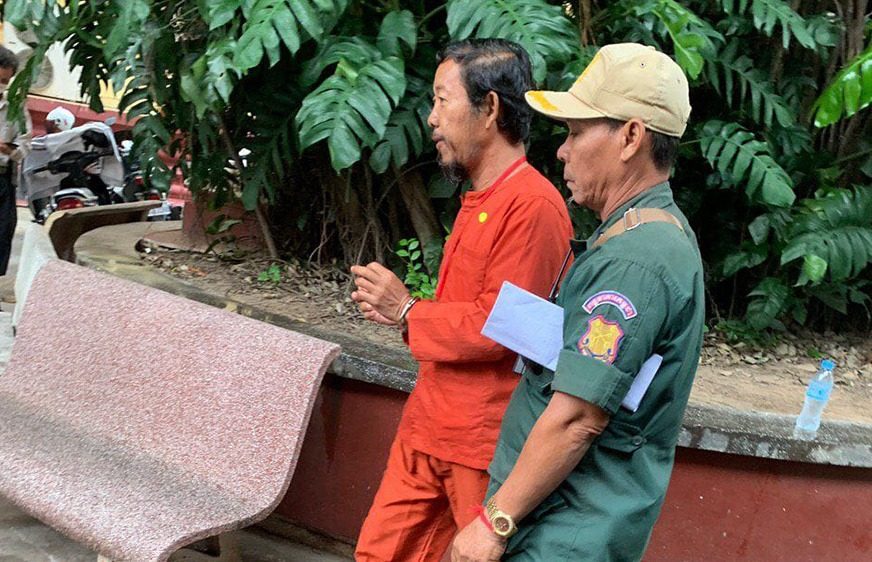At the end of his trial, the prominent union leader tried to make a final request, but the presiding judge would not accept it.
“Then thanks a lot. Let it be up to the court’s decision,” said Rong Chhun. “If the court thinks that continuing my imprisonment is a benefit, let’s do it. If [you] think it is beneficial, do it.”
These were Chhun’s final words on the last day of his trial, another prolonged and contentious hearing. Three defendants were on trial for incitement: Chhun, for his claims that Cambodia was ceding territory to Vietnam; and two activists who came out in support after his arrest, Sar Kanika and Ton Nimol. The government demanded over $1 million in damages.
The morning saw the questioning of a second witness, and the closing statements of the prosecution, government and defense. Then the three defendants were allowed to make their final requests to the judge, which normally entails asking him to drop the charges.
Chhun stood up first and began his request: that the Criminal Code’s articles 494 and 495 be amended because they were unclear.
As he spoke, however, the judge pounded his gavel, interrupted Chhun, and told him to make a request, not give some statement that was outside the bounds of the case. The two articles referred to by Chhun are “existence of incitement” and “incitement to commit felony,” which also includes incitement “to disturb social security.”
The two continued to argue, and Chhun began a new request that the court be professional when making its verdict. Judge Li Sokha stopped him again. “You still say the same thing. You can request your charge be dropped. The court already took an oath.”
Kanika and Nimol asked the judged to drop the charges against them.
The tenor of the morning was in line with the previous three trial hearings, as the nearly three-hour session on Friday morning was filled with clashes between the judge and Chhun.
Under questioning by deputy prosecutor Seng Heang and government lawyer Koun Saroeun, witness Khum Ponna Bann, a national border committee official, told the court that the committee had spent a long time measuring disputed areas and negotiating over them, using proper maps and following the law.
He expressed his regret that Chhun had issued his statement without evidence or a map, instead only based on interviews with local people. Chhun should have sought an explanation from the committee rather than issuing his statement, which led to confusion among the public, Ponna Bann said.
He added that residents in the area were not affected by the ongoing border demarcation process as they claimed.
At one point, Chhun raised his hand to ask a question. But before stating his question, Chhun began to speak that today was the one-year anniversary of his arrest — and was stopped by the judge. Chhun then tried to ask under what law the border committee could swap land with Vietnam. The deputy prosecutor said that was unrelated to the facts of the case.
Chhun continued that he had simply relayed people’s observations. “He said he regretted that I cited people’s words to make an assertion, but as I remember, the prime minister said that officials have to listen to the people. In a democratic country, we have to listen to people. If you don’t listen to people, who will we listen to?”
Government lawyer Saroeun said in his concluding remarks that Chhun’s pronouncements about the border last year were intended to attract people’s attention. Chhun had made them under the banner of an unregistered organization, and had accused the government of causing the loss of territory.
Saroeun said these were all done with ill intentions to make the public blame the government. “Such a case caused damage, affecting the honor and dignity of the border committee and the government,” he said.
Saroeun asked the court to hand Chhun, Kanika and Nimol the maximum sentence and demanded 5 billion riel in damages. Incitement to commit a felony carries a jail term of up to two years.
Deputy prosecutor Heang said Chhun had exaggerated the truth without knowledge and with the aim of inciting chaos in society.
“This shows a dangerous intention, inciting people to express anger against the government and cause hostility with neighboring countries,” Heang said.
However, defense lawyer Choung Choungy argued that there was no witness or evidence that linked his clients to the charges, and asked the court to clearly check the articles of the law rather than expanding their meaning.
He said there was no witness claiming to have seen Kanika at the border or saying that she shared Chhun’s document. She had only expressed support for Chhun, and there was no legal article to punish someone who expressed support, Choungy said.
The defense lawyer added that Chhun had only referred to claims made by other people, and asked the government to more strongly protect the country’s borders.
“If he only expressed his concerns and wanted the government to pay attention,” Choungy said, “Chhun did not commit and cause chaos as he is charged. Please give a tight explanation based on Article 5 of the Criminal Code.”
Article 5 says: “In criminal matters, the law shall be strictly construed. A judge may neither extend its scope of application nor interpret it by analogy.”
Choungy asked the court to drop all charges against his clients.
Defense lawyer Sam Sokong added Prime Minister Hun Sen had in the past made a five-hour speech saying there were some movements in the border during demarcation. Sokong said this showed the people’s claims were true.
“I ask the judge to acquit my clients from the charges and release them immediately,” Sokong said.
Judge Li Sokha is scheduled to announce a verdict on August 18.













